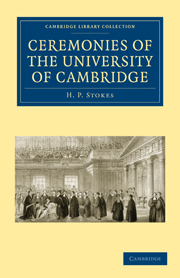Book contents
- Frontmatter
- Prefatory Note
- Contents
- ILLUSTRATIONS
- The Chancellor
- The Vice-Chancellor
- The Registrary
- The Proctors
- The Esquire Bedells
- Matriculation
- Congregations and Graces
- Degrees
- Commencement Day
- Insignia Doctoralia
- Honorary Degrees
- University Costume
- Processions
- The Presentation of an Address to H.M. The King
- The Bidding Prayer
- University Sermons
- The Orator
- The High Steward
- Representation in Parliament
- The Commissary
- University Discipline; the Sex Viri, etc.
- H.M. Judges and Trinity College
- The Admission of the newly elected Master of Trinity
- Commemoration of Benefactors
- The University and College Chests
- Obsolete Officers
- The University and Stourbridge Fair
- The University Arms
- The University Motto
- Index
- Plate section
- Frontmatter
- Prefatory Note
- Contents
- ILLUSTRATIONS
- The Chancellor
- The Vice-Chancellor
- The Registrary
- The Proctors
- The Esquire Bedells
- Matriculation
- Congregations and Graces
- Degrees
- Commencement Day
- Insignia Doctoralia
- Honorary Degrees
- University Costume
- Processions
- The Presentation of an Address to H.M. The King
- The Bidding Prayer
- University Sermons
- The Orator
- The High Steward
- Representation in Parliament
- The Commissary
- University Discipline; the Sex Viri, etc.
- H.M. Judges and Trinity College
- The Admission of the newly elected Master of Trinity
- Commemoration of Benefactors
- The University and College Chests
- Obsolete Officers
- The University and Stourbridge Fair
- The University Arms
- The University Motto
- Index
- Plate section
Summary
InThe Historical Register of the University of Cambridge is printed a list of the Public Orators since the beginning of the sixteenth century, commencing with the name of Richard Croke the Greek scholar. The duties of this officer are to be the mouthpiece and correspondent of the University. As footnotes to the list Dr Tanner has appended a most delightful store of personal anecdotes and illustrations. Such names are included as those of Sir Thomas Smith, Sir John Cheke, Roger Ascham, George Herbert, Christopher Wordsworth, Sir Richard Jebb and Sir John Sandys–the predecessor of the present Public Orator, Mr T. R. Glover.
Sir John Sandys, in the year 1910, published the Orationes et Epistolae Cantabrigienses, which he had spoken or written from the year 1876 when he was appointed after a memorable contest with that refined scholar Mr Charles Moule of Corpus. Till 1920 he continued to make elaborate speeches from the floor of the Senate House. Allusion has already been made (see p. 38) to an incident which occurred when, a schoolboy visiting his future University, he occupied a place in the gallery of that renowned building.
The Public Orator has from the first been entitled “to have precedence of all other Masters of Arts; and, as a mark of honour, to walk in processions and sit in public acts separate from the rest.”
- Type
- Chapter
- Information
- Ceremonies of the University of Cambridge , pp. 58 - 59Publisher: Cambridge University PressPrint publication year: 2009First published in: 1927

